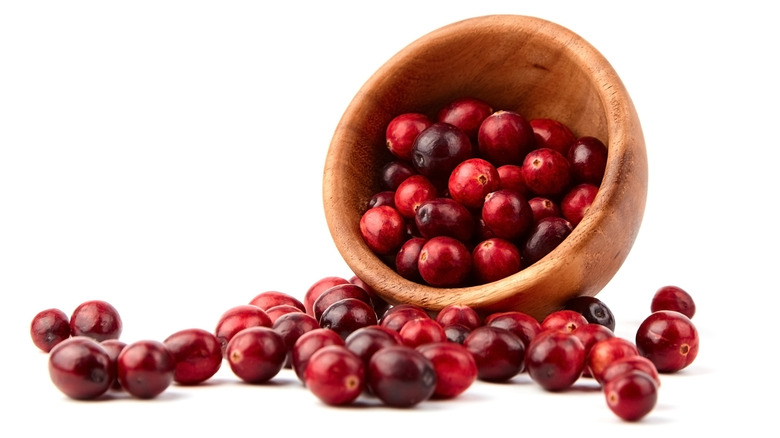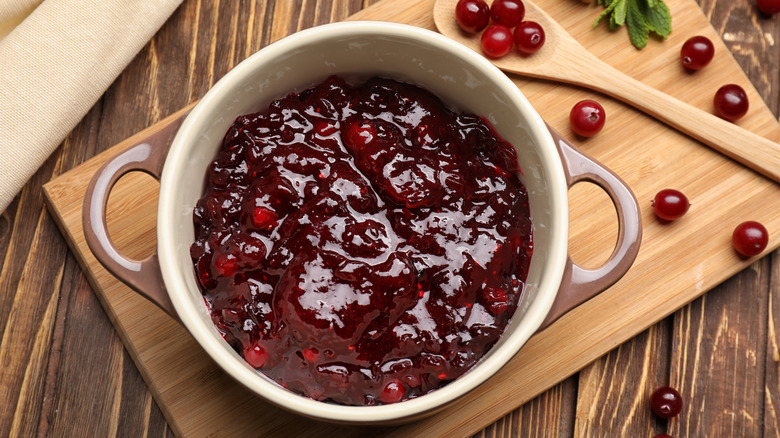Can You Eat Cranberries While Pregnant?
Though cranberries might be a once-a-year dish for many people that they only consider when the fall and winter holidays roll around, many people enjoy the tart fruit all year long. The appeal may have something to do with its limited availability. Fresh cranberries are harvested and sold between September and December each year (via Produce Business).
Many choose to buy fresh cranberries and freeze them for any off-season hankerings, yet you can buy frozen cranberries, too. Cranberries make a nice tart addition to a salad.
During the hot summer months, others drink a daily glass of cranberry juice to quench their thirst. There's also no denying how good it tastes with vodka, though, during pregnancy, alcohol should be avoided (via CDC).
Beyond taste, for those prone to urinary tract infections (UTIs), cranberry juice is a go-to when trying to prevent them. Since UTIs are so common during pregnancy (via National Library of Medicine), you might want to reach for some cranberries or cranberry juice, but there are some risks.
Cranberries supply vitamins and minerals and help ward off disease
Cranberries are a healthy fruit, supplying a wealth of vitamins, minerals, and antioxidants, including B vitamins, folate, calcium, potassium, and magnesium — all vital nutrients during pregnancy (via Medical News Today). They also contain vitamin C and vitamin E, which work as antioxidants and may help reduce the risk of cancer and heart disease. The fruit also helps boost heart health and immunity and lower cholesterol.
When it comes to urinary tract infections (UTIs), it's true that cranberry juice can help ward them off, but it won't treat an existing infection. Cranberries contain a-type proanthocyanidins, which help prevent cavities, inflammation in the body, and UTIs.
"A-type proanthocyanidins prevent the binding of E. coli in the bladder, which is normally the first step of getting a UTI," says registered dietitian Candace O'Neill (via Cleveland Clinic). "If you're someone who struggles with UTIs, it could be a proactive approach."
However, there are some things to be aware of when consuming cranberries during pregnancy.
When eaten in excess, cranberries can cause issues in pregnant people
Since pregnancy is a time of lowered immunity, and anything you eat affects your baby, it's important to learn more about any food you consume in large amounts. Cranberries are nutritious and a wonderful addition to your diet in small quantities. They can help ease pregnancy discomforts like constipation and water retention, but, if you consume too many, you may experience some negative side effects.
Cranberries contain a mineral called calcium oxalate. When this builds up in the blood — and, consequently, in the urine — it could cause kidney stones, especially if you're prone to them (via Healthline). For this reason, supplements containing cranberries should be avoided.
In addition, cranberries contain fiber, which is great to help ease pregnancy constipation. But, if you eat too much, you may have excess gas or diarrhea.
Though the sugar content of fresh cranberries is low, at just 4 grams per cup, some canned cranberries or premade cranberry dishes at restaurants or grocery stores can be sweetened with a lot of sugar (via Taste of Home).
When eating cranberries, choose unsweetened ones to keep your blood sugar stable throughout pregnancy, and eat them in moderation.


